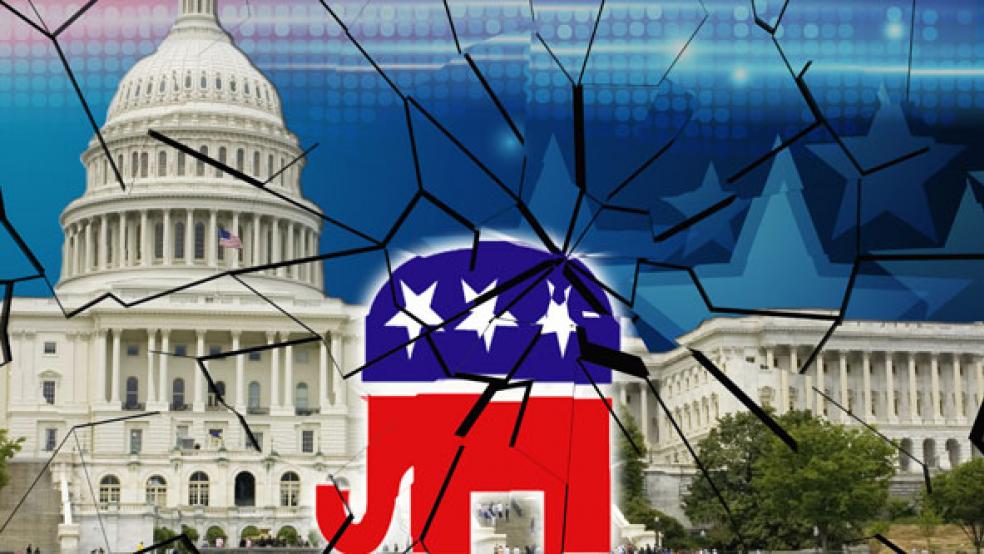GOP lawmakers are—for the moment—without an exit strategy in their budget battle against President Obama.
House Republicans last week passed a temporary spending measure to keep the government open until Dec. 15. As part of the bill, the chamber in a largely partisan vote gutted the financing for Obamacare and its health insurance exchanges that are slated to open next month.They claim their mission is to save the country from Obamacare, but they soon might need to retreat from this stance to save face and avoid a government shutdown at the start of October, when the next fiscal year begins.
That measure is unlikely to clear the Democratic majority Senate, with the chamber’s Majority Leader Harry Reid (D-NV) vowing to approve an amended version that preserves funding for Obamacare. This leaves GOP lawmakers with three options:
* Filibuster Reid’s bill in the Senate, provoking a government shutdown
* Block the amended Senate bill in the House, also provoking a government shutdown
* Allow a continuing resolution (CR) to pass that would finance the government and Obamacare, and two weeks later, use the $16.7 trillion debt ceiling as leverage to defund the health insurance program.
RELATED: WASHINGTON IN CRISIS AS SHUTDOWN, DEFAULT AWAIT
The strategy is full of ironies. A recent NBC/Wall Street Journal poll shows that a majority of Americans dislike the health insurance coverage being mandated under Obamacare, but they also oppose the tactic of defunding its programs.
Republicans say the 2010 law has weighed down the economy with uncertainty, but their own plan has stirred up the uncertainty of a government shutdown, if not a default on government obligations. It’s a contradictory argument coming from the GOP, one that assumes—without much evidence—that Obamacare would be worse for the economy than the stalemate they’re promoting.
“This [health insurance] law is creating enormous uncertainty that has Americans on edge, that has Americans understanding that they could lose their jobs, they could have their wages or their hours cut, and they could lose their health care benefits,” said Sen. Mike Lee (R-UT) on NBC’s “Meet the Press.”
The GOP has made the operation of the government contingent on delaying and defunding a law that should provide 14 million more American with insurance coverage next year, according to estimates by the nonpartisan Congressional Budget Office.
“We are united around a very simple goal, and that is keeping the government open while protecting our constituents from the harmful effects of Obamacare,” Rep. Tom Graves (R-GA) said on ABC News’ “This Week.”
WHAT'S THE END GAME?
Just eight days before a possible shutdown, Republicans have yet to assemble much of a game plan. Sen. Ted Cruz (R-TX) suggested to Fox News Sunday that a filibuster could be threatened, but he might not have the backing from 40 of his colleagues to stop Reid in a procedural vote.
RELATED: ‘CRUZING FOR A LOSING’ WITH THE SENATE’S PIED PIPER
“Well, we don't know right now and this week, we'll determine that,” said Cruz, who helped instigate the use of Obamacare as a concession in the budget. “Look, this has been a fast moving target. You know, just a few weeks ago, we didn't have any of the votes we needed in the House or in the Senate.”
Cruz suggested that if a CR gets returned to the House, then that chamber and its Republican majority could pass smaller measures to continue funding the military, essentially trying to fight a war of budgetary attrition. But Cruz has suffered a blow to his credibility in the House, with Republican staffers upset that he cannot deliver much help on the Senate side.
MORE FROM THE BOEHNER CHRONICLES
House Speaker John Boehner (R-OH) has yet to commit publicly to any plan. But either forcing a shutdown or taking a piecemeal approach to spending makes it hard for the GOP to convince the country that the problem rests entirely with President Obama.
The motive behind defunding Obamacare was to force the White House into making the call for a government shutdown, but that looks close to impossible if a bill never reaches his desk. Still, Republicans are pushing that argument, hoping it will catch on with the public.
“I would hope the president would value keeping the government open over preserving a law that most Americans are against,” Rep. Matt Salmon (R-AZ) said CBS News’ “Face the Nation.”
And by forcing a choice, it has become easy for Democrats to paint the GOP as the source of the gridlock and full of malicious intent. House Minority Leader Nancy Pelosi (D-CA) dubbed them “legislative arsonists” on CNN, saying their temporary spending bill was a “wolf in wolf’s clothing.”
Pollster John Zogby said that the Tea Party movement driving the issue comes off as unreasonable and close-minded to voters. “This is a clear example of one fragment of the party, the Tea Party, saying, ‘My way or the highway,’” Zogby said.
Because the debt ceiling awaits, some House Republicans assume they can back down on the CR and merely force a year-long delay in implementing Obamacare in return for increasing the Treasury Department’s borrowing authority. “It’s kind of like the follow-up plan,” Rep. John Fleming (R-LA) told The Hill.
That possibility also fits with the picture of Boehner as speaker, even though the president has stated multiple times that he will not negotiate over the credit of the U.S. government.
In past showdowns over the debt ceiling in 2011 and the fiscal cliff last year, Boehner has shown himself to be a survivalist, able to escape without a full-blown crisis to fight for another day. If Boehner sincerely wants to avert a shutdown and a default, then his logical move will be to pass short-term measures that keep the government running, without removing the pressure on the president.
“Republicans have no interest in defaulting on our debt,” Boehner said last week. “We just want to find a way to pay it off.”



